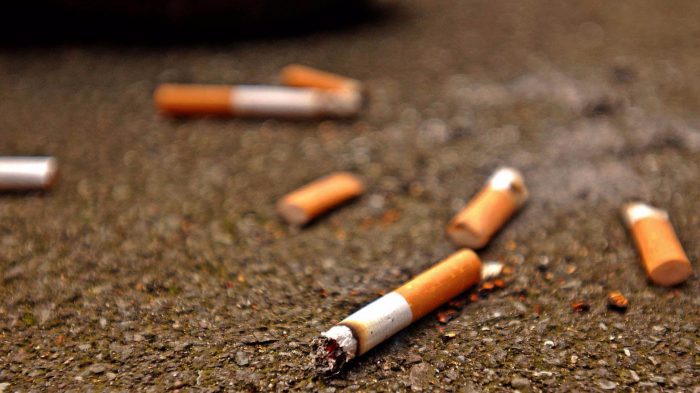Civil society and public health groups under the aegis of the Nigeria Tobacco Control Alliance (NTCA) have opposed the “Draft Policy on Conventional Tobacco and Non-Combusted Alternatives to Cigarette Smoking” advanced by the tobacco industry, urging the Federal Ministry of Industry, Trade and Investment to jettison the proposal and the spurious narratives that are used to justify it.
Public health groups learnt that the tobacco industry proposal which is being considered by the Ministry seeks to develop a regulatory framework to encourage smokers to switch from conventional or combustible cigarettes to Heated Tobacco Products (HTPs).
The NTCA, in a letter to the Honourable Minister of Industry, Trade and Investment, Niyi Adebayo, dated July 28, stated that the draft policy is misleading, contravenes the National Tobacco Control (NTC) Act, 2015; its Regulations of 2019, and the World Health Organization’s Framework Convention on Tobacco Control (WHO-FCTC) which Nigeria ratified in 2005.
In the letter titled ‘Attempts by the tobacco industry to create a constitutional crisis in Nigeria and the attendant public health concerns,’ signed by NTCA Board Chair, Akinbode Oluwafemi, the group referenced Section 1(m) of the NTC Act which states that Nigeria’s obligation under Article 5.3 of the WHO FCTC includes ensuring that tobacco control policies are implemented over and above any contrary interest of the commercial and other vested interests of the tobacco industry on account of the inherent and irreconcilable conflict of interest between the goals of public health policies for tobacco control and the commercial interests of the tobacco industry.
 Source: https://currencyrate.today/converter-widget
Source: https://currencyrate.today/converter-widgetCopies of the letter were sent to the president, vice-president, senate president, speaker of the House of Representatives, secretary to the government, Attorney-General of the Federation as well as the Minister of Health.
The group insisted that the misleading claims by the tobacco industry on e-cigarettes and other so-called alternatives have been debunked by the WHO, which has repeatedly said that e-cigarettes and HTPs are “undoubtedly harmful” and that countries “that have not banned [e-cigarettes] should consider regulating them as harmful products.”
Countries that have banned e-cigarettes are Argentina, Brazil, Brunei, Cambodia, Ethiopia, The Gambia, India, Iran, Lebanon, Macau, Mauritius, Mexico, Oman, Panama, Qatar, Singapore, Sri Lanka, Suriname, Syria, Thailand, Timor-Leste, Turkmenistan, Uganda, and Uruguay. The HTPs have also been banned in Australia, Brunei, Brazil, Cambodia, Ethiopia, Finland, India, Malta, Mexico, Panama, Qatar, Singapore, Sri Lanka, Thailand, Turkey, and Uganda.
The NTCA urged the minister to note that the United States Food and Drug Administration (FDA) had denied Philip Morris’ claim that switching from combustible cigarettes to the company’s HTP brand, IQOS, will reduce the risk of disease and stated: “[Philip Morris] has not demonstrated that as actually used by consumers, the products sold or distributed with the proposed modified risk information will significantly reduce harm and the risk of tobacco‐related disease…”.
Importantly, the group, continued, the FDA did not find either that IQOS is “safe” or even “safer” than other tobacco products or that IQOS can help smokers quit and banned Philip Morris from making claims in the U.S. that switching completely from conventional cigarettes to the IQOS system can reduce the risks of tobacco‐related diseases”; and switching completely to IQOS presents less risk of harm than continuing to smoke cigarettes.”
According to the letter, “Given the significant scientific uncertainty about the overall risks and potential benefits of e-cigarette use in adults (and its known harms to the youth) and the evidence to date of the harmful effects of HTPs, every novel tobacco product including HTPs and ENDS should be banned in Nigeria while every new product should be subjected to thorough scrutiny by the Federal Ministry of Health and other relevant regulatory agencies in the country”.
The NTCA reminded the minister that Nigeria is currently burdened with cardiovascular diseases which have led to the loss of manpower and the attendant burden on public healthcare facilities.
It cited the Tobacco Atlas, which recently documented that about 16,100 Nigerians die yearly from tobacco-related causes and empirical studies which show that the nation loses about $800 million annually including direct costs related to healthcare expenditures and indirect costs related to lost productivity due to early mortality and morbidity caused by tobacco use.
The group urged the minister to disallow any entity from misleading the ministry through spurious narratives of employment generation, exports potential, revenue for the government and other “empty promises.”


![EYYUV0FXgAA5mb4 Minister of Trade and Investment, Adeniyi Adebayo[PHOTO CREDIT : @NiyiAdebayo_]](https://i0.wp.com/media.premiumtimesng.com/wp-content/files/2020/07/EYYUV0FXgAA5mb4-e1596024047162.jpg?w=600&h=429&ssl=1)













No Comment